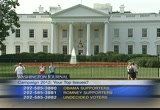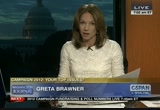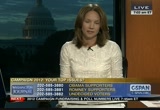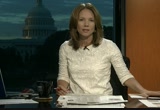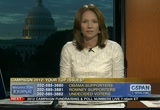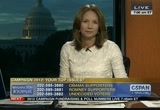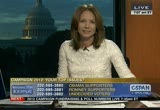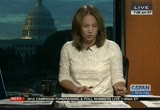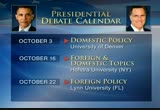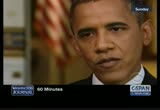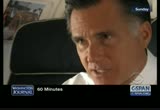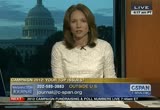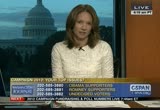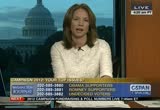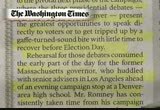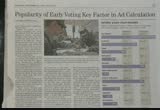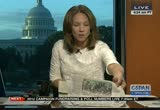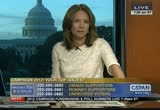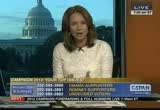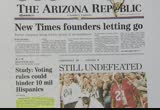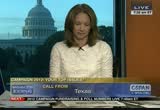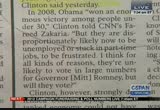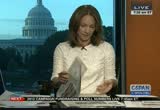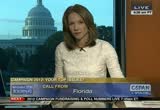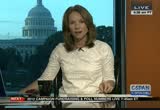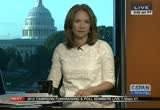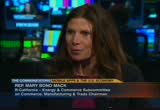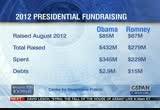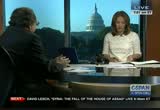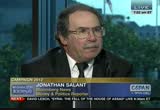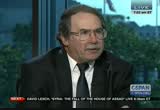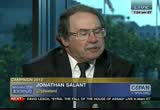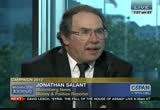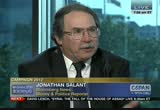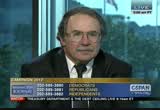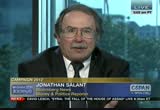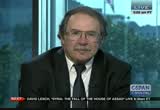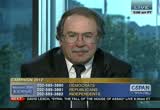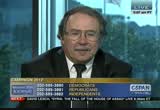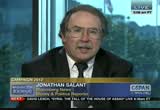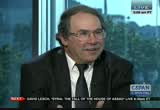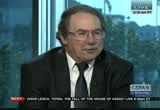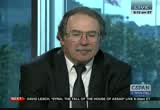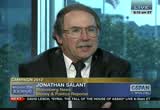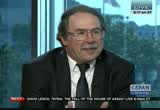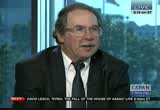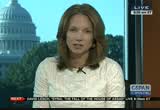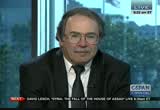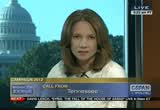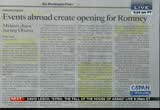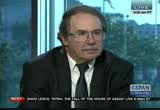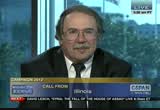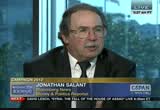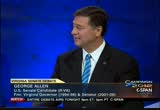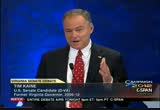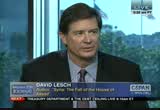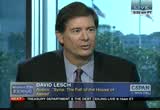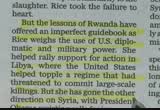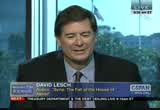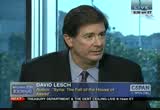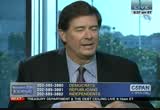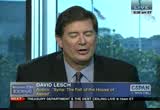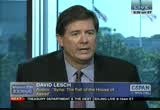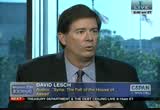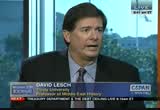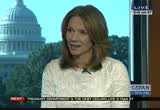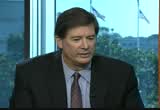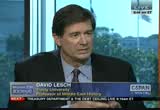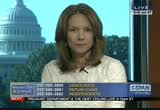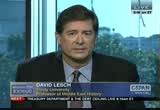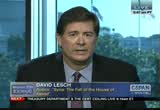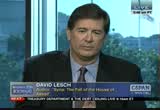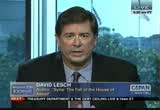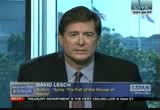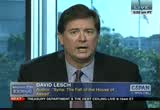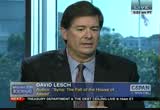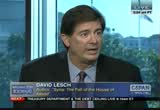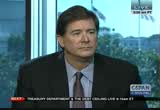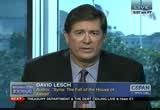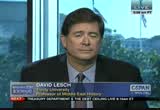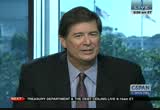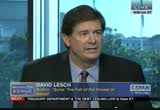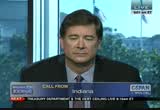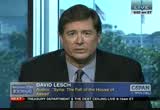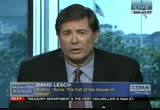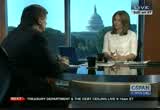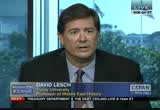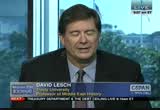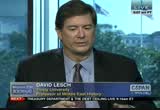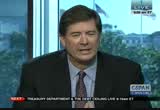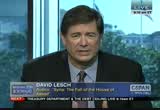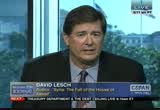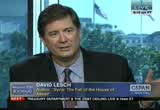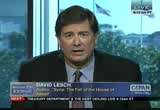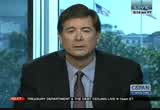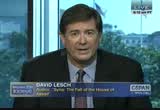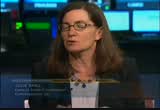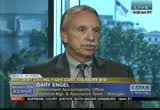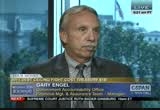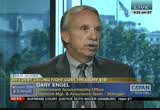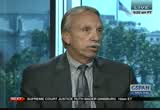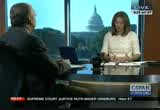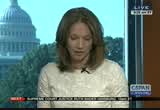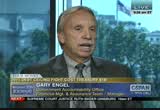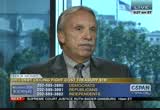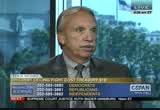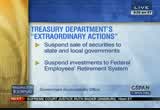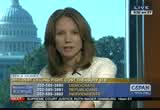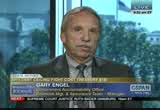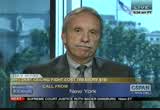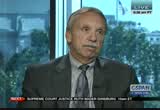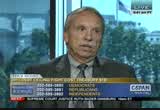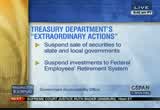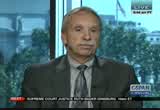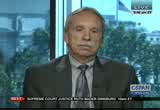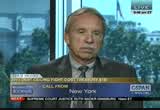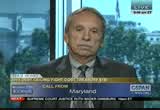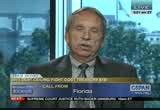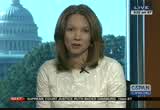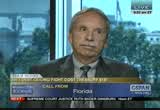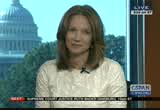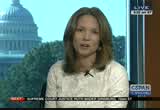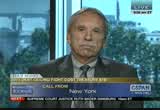tv Washington Journal CSPAN September 24, 2012 7:00am-10:00am EDT
7:00 am
presidential campaign fund raising and cost. then, trinity university professor david lesh talks about his book "syria-the fall of the house of assad." and from the government accountability office, a look at the treasury department actions to avoid hitting the debt ceiling of the estimated $1 billion cost. "washington journal" is next. host: good monday morning and welcome to washington journal. "usa today" says -- the president is speaking to the united nations on tuesday. both candidates preparing for next week's first presidential
7:01 am
debate in denver. secretary of state clinton speaks at resident's clinton .lobal initiative holbei we will stick with politics this morning and get your take on who you are voting for and why. what is your top issue? we also want to hear from undecided voters or soft voters. what are your top issues? and you can send us a tweet. also, post your comments on facebook. or send us an e-mail. we will begin this morning with the latest battleground poll from "politico" and george
7:02 am
washington university, showing president obama with a slight edge. governor romney was leading in may. now the latest poll shows president obama up with 50%. some other tidbits about this poll. it says -- obama leads from the on the issues of handling the economy, foreign policy, taxes, medicare, and standing up for the middle class. but romney leaves on better handling of the federal budget and spending. 38% of voters surveyed said the presidential debates are not an
7:03 am
important factor in their vote and 84% said that they would not consider voting for another candidate. your top issues. we want to hear from romney and obama supporters and undecided voters. scott is up first in texas. caller: i believe romney will win with a landslide. the economy, gas prices, for and policy, the debt. the obama administration has been a total failure. i don't know what else we should have expected from the least qualified individual to ever hold office. host: what qualifies mitt romney for the presidency? caller: his entire life. he is one of the most compassionate, caring individuals. he is not the narcissist in
7:04 am
chief. he is a great individual. host: what do you do? caller: i am self-employed and sami retired -- semi-retired. the polls are skewed. host: so you think it's going to be a landslide. other polls are showing it's a tight race. why do you think a landslide? caller: because the republicans, including myself, the base, cannot wait to go vote against this usurper, this pretender we have an office. host: are you voting against president obama or for mitt romney? caller: both. very much for romney. he's going to be a great president. the comparison between the two
7:05 am
is unbelievable. host: we will go to a president obama supporter in annapolis, willie. caller: good morning. i disagree with the guy who just spoke with you. i think it's going to be president obama. i think that he's going to bring jobs. things have not been the way they should, because of the republican congress. if they lose, it's going to be a big civil war in the republican party. you've got so many factions out there and the whole thing is defeating the president. they cannot even talk about anything else. host: what are the top issues for you and why president obama on those issues? caller: he has done a great job and has gotten health care through. he inherited a bad situation even though the unemployment is 8.1%. tremendouss done a job on foreign policy.
7:06 am
host: maria is undecided in new albany. caller: i love c-span. it's great to be on. i am absolutely undecided. i am waiting to find out how president obama appeals about natural gas drilling. my area is being cut to pieces. three counties around me, it is like swiss cheese. it is dangerous, what we are doing with natural gas drilling. i need to find out where both candidates stand on this issue. host: you have not been able to find that? caller: first, i was excited when he blocked the keystone pipeline, but then president obama turnaround and open it up. i have not been able to find information on where they both stand. i know that romney wants to keep drilling. host: we did a segment with a reporter from bloomberg business
7:07 am
week who had written a piece about president obama and how he has not done a lot of regulation when it comes to natural gas and the fracking procedure. you should probably go to c- span.org to our video library and search for that, if you are interested. caller: was that the josh interview that you did? host: it was. caller: i love him. i believe some of our counties will be covered in his film, which i am excited about. i sure hope this becomes important in the debate. host: let me show you the washington post --
7:08 am
7:09 am
we will hear from a romney supporter in pennsylvania. maria, go ahead. caller: i am supporting mitt romney. i believe he will focus more on the job and hand. i think the president actually is not focused. he is just complaining all the time and goes on all these talk shows and is not really dealing with at hand. is not paying attention. i am not impressed. host: how did you vote in 2008? caller: i voted for john mccain. i felt mr. obama did not get
7:10 am
enough experience to be president of the united states. host: now to south carolina, a president obama supporter, dori. caller: what i heard people say really concerns me. i think the president has been very clear on his position. i don't think people are looking at information. i think a lot of them are listening to news programs a lot of times. one of the things that really concerns me, and i don't hear enough about this, i don't want other people telling you about my health and what decisions i have to make for my life and my morality. there is too much conversation from a lot of people in the gop and mitt romney is not an independent thinker. he will not stand up against people who are taking a real hard-line position to the right on those issues. host: were you overly excited -- how would you describe yourself
7:11 am
in 2008 when you voted for president obama? excited about his administration? compare that to how you feel now. caller: i was not excited. i was convinced he was the right person, especially when sarah palin was elected as vice president. i am more convinced this election than i was last time, because mitt romney has proven that he does not stand for anything and that he is willing to do whatever he is told by his big money donors. he has flip-flops so much on its positions that it is clear he does not have a position and will do whatever he's being told. host: are you clear what president obama's position is on the economy on creating more jobs? caller: very simple. stimulate the economy, get more people to work by putting people into growing positions, not just in the government sector but
7:12 am
also encouraging new technologies, new firms, new start-ups, and offering a hand up to people in need, and getting people back to work. i do think his position is a lot stronger than romney's. romney had very poor results when he was governor in massachusetts. the president has taken us back from a situation where we were losing hundreds of thousands of jobs. now we are adding jobs over the past 24 months an. host: what do you do? caller: i am in finance. host: here is the new york times with this headline this morning -- thehose debates, here's is
7:13 am
lineup for the presidential debates -- there will be talking about the economy on october 3. on october 16, foreign and domestic topics at tulsa university. at lynneign policy on octobe university in florida. clyde is undecided, in asheville. -- in: i' nashville. caller: i am undecided because they don't have ron paul as a choice. my take is both of these people
7:14 am
are lapdog for somebody and that bothers me. caught up with answering to powers. just like the lady from south carolina, like she said, mitt romney, his decisions are made for him. i think barack obama, the lord knows he has some issues. host: how did you vote in 2008? caller: i voted for barack obama mostly because of sarah palin. i campaigned for john mccain against george bush until he started changing some of the positions that he had maintained his whole life. i would have followed that man.
7:15 am
host: all right. president obama talk about the 2008 campaign. [video clip] >> i am the first one to confess that the spirit of that are brought to washington that i wanted to see instituted, where we were not constantly in a political slugfest but focus more on problem solving, i have not fully accomplished that. have not even come close in some cases. if you ask what my biggest disappointment is, that we have not changed the tone in washington as much as i would have liked. host: that was president obama last night. governor romney sat down for his interview with the network and talk about taxes. [video clip] >> you made on your investment personally about $20 million
7:16 am
last year and paid 14% in federal taxes. that the capital gains rate. is that fair to the guy who makes $50,000 and pays a higher rate than you did? >> it is a low rate. one of the reason the capital gains rate is lower is because the capital has already been taxed one time at the corporate level, at 35%. so i think it is the right way to encourage economic growth. to get people to invest, to start businesses, to put people to work. host: your top issues of campaign 2012 is what we are discussing. why you are supporting your candidates and what are the issues. now on twitter -- backlick road to a romney supporter in waterbury, lou. -- let's go to a romney
7:17 am
supporter. caller: i have been voting libertarian since the early 1990's. the president does not work and government does not work. i could never vote for barack obama because he is a socialist . host: you are voting against president obama rather than for mitt romney? caller: yes, i have to choose the lesser of two evils. i have to vote republican. i prefer libertarian, but that will never happen in my lifetime. anyone who votes for barack obama supports socialism. host: leesburg, virginia, lori
7:18 am
is undecided. caller: every time i hear mitt romney i always say this is more and more reason i cannot vote for him. he is so out of touch with everybody, it is almost embarrassing. one thing i have learned from working besides people in corporations is anybody who's ever worked for corp., their main concern is not people, its profit. i don't care whether the profit is from laying off people are sending jobs overseas, i don't think mitt romney has a clue what it is to deal with people, people that are not in his income bracket. host: so you are undecided. what is your hesitation about president obama? caller: i initially voted for hillary clinton. i did not vote for obama because i thought he was a little naive. i think that he went into the white house too early.
7:19 am
not that i did not think he could do a good job, but he had not been there long enough to know certain things. he really believed he could change washington. he had not been there long enough to know he could never change the republican party leaders. he definitely did not see the tea party coming. that's the reason i could not support him. i fall in line with issues mostly. i am kind of on the fence now and probably leaning towards obama, because romney is all over the place, talking loud and saying nothing. i cannot get anyone who does not understand basic principles when it comes to people. that strikes me. i would rather deal with the devil that i know. host: what are your top issues? caller: i am so frustrated. my top issues are the economy
7:20 am
and jobs. i cannot get over that he cannot pass a jobs bill when the republican party says we will not do anything to help you pass a jobs bill. it is so embarrassing and frustrating. this is the other thing to consider. if the senate goes democratic, romney will be in the same position that obama is. you will have a conferen -- a congress that will deflect on everything and we will be back in the same situation. host: who do you think wins the election? caller: i think obama will take it, largely because he gets it and that speaks volumes. host: hillary clinton, possibly running for president, resident was asked about that on cbs yesterday. >> i don't know. she has worked hard 20 years. we had eight years in the white
7:21 am
house and tim brant for the senate and served in new york eight years and immediately became secretary of state. she is tired and has really worked hard. i'm very proud of her. but she wants to take some time off, kind of regroup, write a book. i hope we will be working together. if she was doing this work long before i was. a lot of what we do now started with some things that she began in the state department. i think we should give third chance to organize her life and decide what she wants to do. i just don't know. she is an extraordinarily able person. never a better public servants than her that i've met. i have no idea what she will decide to do. host: former president bill clinton on his wife's political future, saying he has no idea. here's the "washington times" --
7:23 am
7:24 am
7:25 am
7:26 am
president obama as well will be going back to the northern part of the state on wednesday. vice presidential candidate paul ryan also today in ohio. alexandria, virginia, brad, a romney supporter. thanks for waiting. caller: i am a generalist, but we are confronting so many problems such as the foreign- policy in various regions of the world. what we need is a president as a statesman, a person who can find a compromise can keep his eye on the big prize, which is getting legislature passed and making decisions and finding balance. i will vote for governor romney, although i voted for obama in 2008. two main issues. one of them was the health care law that president obama past, which he essentially got no support from anybody on the republican side. this was a major policy and he
7:27 am
got not one person from the republican party to support his health care suggestions. second, his immigration where he basically legalized 1.8 million young previously labeled as illegal immigrants. he made that by executive decree. we had a debate going on called the "dream act" debate within our legislature and he basically overrode that and just drove it home. we are a nation of laws. not a president or any person stands above that. the legislature must pass laws. host: lead asked, you are going to vote for governor romney, wh wo do you think wins-- who do you think wins? caller: i went to the dnc.
7:28 am
i don't know. probably the president is going to be reelected. i hope night. host: why? caller: like many of your callers have said, he connects better with the american people. isdon't want a president who my buddy. i want a president who can make hard decisions, help grow the economy, give us a strong representational overseas. that my opinion is the majority. i think people want someone they can relate to. host: would you do? caller: i am a military officer. host: have you traveled overseas? caller: i have done two tours in iraq and two in afghanistan. host: what about president obama leaving iraq and planning to
7:29 am
leave afghanistan? aq, he should've gotten a status of forces agreement with the government over there and we should of maintains an air base so we would have a presence. now we have left and recently there were saying how many shipments of weapons from iran are flying over iraqi airspace into syria to support the assad regime with all the atrocities committed over there. in terms of afghanistan, joe biden was the only person in washington who got afghanistan right from the beginning. if you look at the debate with the obama surge happened, when we were going to decide between $10,000, 40,000, and 80,000 troops, it was joe biden, he was
7:30 am
the only one who said that, let's stick to our issues and our priorities. i was wounded in afghanistan during a a non-transmission, walking down the street in a dusty village that we were being pulled out of. i was nearly killed for essentially nothing, trying to bring some kind of ideal of liberal democracy to people that it would take a generation in afghanistan. host: is this a top issue for you in the campaign, iraq and afghanistan? caller: no. the reason i voted for obama, although he was not very experienced, but i felt joe biden had a great record. so i think foreign policy is a strong suit that the president runs on. the recent nonsense in the middle east, i don't think it matters, ultimately. if we look at u.s. foreign-
7:31 am
policy interests, 23 arab nations, what do they produce economically, what do they provide for the world? if we were to push for energy independence, they don't offer us anything accept for violence and problems. we should maintain a small presence over there. host: how old are you? caller: 36. host: thanks for your call. here's the front page of the arizona republic --
7:32 am
it president obama supporter in texas, johnnie. caller: well, i am supporting barack obama, because romney cannot even agree with his own vice president. he keeps saying -- even last night he made the remark, well, i am the president, so it does not matter what my vice president says. so they cannot even get together as president and vice president. if he gets where barack obama is now as president, i don't know how he thinks he can overcome the conflicts obama has had with the gop, in congress. he cannot even agree with his vice-president. so there's no chance. host: jonathan in toledo, ohio, is undecided. caller: i refuse to vote for one
7:33 am
candidate simply because i don't like the other. host: what does that mean? caller: they both have their good and bad. romney would prefer free markets. that's what got us into the housing situation. obama past -- and i cannot support that. host: are you going to vote? caller: if i could vote ron paul, i would do that. host: how old are you and what you do? caller: 26 and i'm a student. host: are you a student on campus in toledo? caller: yes.
7:34 am
host: more on president clinton, a former president, quoted in the new york post saying that because of the poor economy, president obama could have a hard time securing the youth vote that carried him to victory. and they are unlikely to vote in large numbers for mitt romney. and in the "washington times" --
7:35 am
a supporter of governor romney in fort lauderdale fort, tom. caller: good morning. my concern for this nation with regard to this election has been the democrats are lying through their teeth and getting away with it and people cannot seem to figure out these lies. if we do some simple math, our current annual deficit is $1.20 trillion.
7:36 am
that is one doubts into hundred billion dollars.-- 1,200 billion. everything's going to be wonderful and medicare will be paid for and our deficit will go away and the wars would be paid for. this would bring $65 billion to $80 billion. $80 billion from the 1002 and hundred, that leaves you 1000 $120 billion that the democrats will not even talk about. -- $1,200 billion. host: now to our next caller.
7:37 am
eric. caller: i would like to talk to all the people who say they are voting for the lesser of two evils, you should take a third- party challenge and right in ron paul. -- write in ron paul. he's the only one with a workable plan. the two-party system is what has got us in the place we are right now. host: the front page of usa today --
7:38 am
and the chicago tribune has this follow-up story after the teachers' strike ended -- a president obama supporter in westfield, massachusetts, nell is on the air. caller: women's rights issues, that is something that neither politician is really touching on much. president obama is pro-choice. mitt romney is absolutely pro- life. pro-choice has to be the way to go. what you do with your body is a moral issue. it's up to you to decide. for the government to say you can do this and you cannot do
7:39 am
this and so on when it comes to your own health, that's your own issue. it's nothing the government should step into and tell you what to do. host: now from new york, supporting governor romney, jean. caller: my problem is on his foreign-policy. we know what's going on at overseas. building up the military in venezuela. he has opened our borders up so anybody can come in. i have a real problem with the media. like you have been reading on the tv this morning, everything knocks romney, but they cover up everything obama does wrong. i have a real problem with it. if you want the truth, watch fox news. host: what are your top issues,
7:40 am
foreign policy? caller: foreign policy. and i get tired of everybody saying everything is bush's fault. after clinton gutted glass- steagall, the bush administration tried to put some restraint on the banks and stuff. we had a good old chuck schumer and then senator obama filibustered the bill in the senate. these are all democrats. don't blame this on bush. host: a president obama supporter in texas, city. -- cindy. caller: i hear people saying obama is a socialist, but he got the health care bill from
7:41 am
romney, what he passed in massachusetts. so does that make romney a socialist? they went after obama's religion. has anyone even looked up mormon beliefs? i don't believe in the way romney believes. host: did you vote for obama in 2008? caller: i did, because i did not like sarah palin. host: were you an enthusiastic voter in 2008? caller: john kerry and it george bush, i cannot vote for george bush again, so i did not vote that year. in 2008 i quit watching fox news and started watching c-span and other channels. i realized i did not like to be lied to. people need to get off fox news and watch other channels and compare everything else before they take fox news at its word. host: so you don't want fox news
7:42 am
anymore. what other channels do you watch? caller: i watch cnn, bbc, my local news, c-span, all the debates. people need to watch the debates on c-span, because you would be surprised how much you will learn on how they vote and what they stand for. they will get up there and debate and then turnaround can tell a different story. host: what do you do? caller: i'm a housewife and a grandmother. host: let's go to an undecided voter, don in somerville, florida. caller: one issue is a president should pay more attention to his own job and let hillary clinton do more on job. he keeps interfering with what she is doing and not paying
7:43 am
attention to what he is supposed to be doing. host: how is interfering? caller: every time she goes to try to make a deal with somebody, then interferes with that by doing something to interfere with what she's doing. host: why are you and decided? caller: if he would just do his job and let her do her job and then i think that would work out better. he's not letting anybody do their job that's supposed to be doing their jobs. in her case, she cannot do her job because of his interference. host: which way are you leaning in the election? caller: i voted for the president last time. i am leaning toward running right now -- romney right now. when the latinos get pulled over, they cannot haller discrimination anymore. so they will just take everybody
7:44 am
to the border. host: what makes you want to vote for romney? his health plan is different than president obama's and it worked out pretty good. host: paul is a governor romney supporter in florida. caller: my main issue with the president and why i support mr. romney is be our small business owner and the regulations that have been coming down through the obama administration are just killing us. we are being regulated to death. we are in a home health-care business. when mr. obama says he does not regulate as much as bush does, that's not true in our business. host: have you ever voted for democrat? caller: yes, i've been a
7:45 am
democrat before. i was a city manager before i owned a business and was very active in local government and did things like that. so i understand how government works and how it makes revenue and deals with things. being a business owner, now, i understand what we do with regulations. some of the regulations are just plain stupid and they just repeat themselves over and over again. host: is there anything president obama could say or do to convince you to switch and vote for him? caller: there isn't. when they passed obamacare by three votes or four votes, if you had five council people and won 3-2 on an issue, you would have lost. the country being so split, a
7:46 am
that is split win, just a temporary fix. host: we will take a short break and then finish our conversation on campaign 2012 with jonathan salant and then will talk about syria with author david lesch about his latest book and what is next for that region. we will be right back. >> ♪ [video clip] >> we are trying to encourage developers to think about what information they need to make the application functional. if you are playing a game, do they really need to collect geo location information that will track and consumer if it is aggregated and collected, can aggregate the consumer as she passes through the world the entire day and for all days?
7:47 am
what information is really needed to make the application functional? who all ? should see all should access be limited-- who all should see it? >> one of the biggest problems is the workforce. they are still looking for more and more people to move into this industry to develop applications and work on creating apps and all that goes into them. the fear people have is somehow in washington we will decide to tell everybody how to do their business or how not to grow their business. the only real fear was workforce issues. the rest of it is nothing but optimism. >> smartphone apsa, privacy, and the u.s. economy, tonight on c- span2. -- smartphone apps. >> even those of us who have
7:48 am
good memories will forget, particularly if an idea is just a fleeting something of interest and then it disappears. one of the things i have found a lot of people do and i tried to as well is not just to write everything down, but to keep everything tied together. don't overorganize your notes in folders and things like that. if you want to allow interesting conclusions to happen between your ideas. the important thing is to go back and read all those notes. go back and look at your notes from six years ago and revisit that passed self and all the ideas he or she had. that's a conflict was like for most of the great minds of the enlightenment. they would stitched together passages from books they read, but they were inspired by, and they would write their own notes sometimes and then there would go back and read this book which was every mixed kind of sample,
7:49 am
kind of clippings of all these other ideas and their intellectual presence in their intellectual self was formed by this reading and be imagining other people's ideas. >> steven johnson will be our guest on sunday, looking at the cyberworld's popular culture in computer networking and politics. live sunday october 7 at noon eastern on c-span 2. "washington journal" continues. host: we're back with jonathan salant, the money and politics reporter for bloomberg news. and we will continue talking about campaign 2012 and dig into the latest fundraising numbers. president obama has raised $85 million as of august. what you make of the numbers? guest: obama has about $88
7:50 am
million to spend. romney has $60 million to spend. the president has a lot more money at his disposal to purchase ads. host: so far spent -- where are they spending this money and is that the height of? of? guest: we will see more money spent. the republican national committee has $70 million in the bank and super pacs have $30 million or $40 million in the bank to spend it. romney has money in his joint fund-raising account that he has not tapped yet. obama spends a lot of money on ads, much more than romney, to get his message across. a lot of offices, huge payroll,
7:51 am
in place, but romney has not done that yet. host: the grass roots effort on the ground is better for president obama than romney? guest: he's been doing it two years now, putting offices in place. host: governor romney has been campaigning as well. why does he not have quite extensive ground game? guest: he had a primary to fight. obama was hiring people last year and romney did not know if he would be the nominee. host: obama raised more than romney, dependent on dependent -- dependent on super pac edge. guest: they can run ads supporting romney. they ran a lot of negative ads
7:52 am
against gingrich and santorum and then helped romney win the primary. host: we have seen the story today that even though these super pacs are spending all this money, it does not appear to be helping those in favor of governor romney spent a lot in states like michigan, but president obama is up in the polls in that state. guest: obama spent his own money. super pacs have helped romney make up the fund-raising deficit. romney doesmillion not have to spend. priorities usa action has started to get much better in fund-raising, but they are still trailing. host: we have heard reports that governor romney says he will take a break from fund-raising and do more campaigning. guest: this is the first
7:53 am
elections since watergate which brought down richard nixon in which the candidate is taking public money for the general election. they will be raising money from here until november to try to finance their campaigns. even though bunny takes a break, he still has to bring in more money, as well as obama, and the super pacs after bring in more money, as well as the parties. host: what is the campaign looking like and where are they going? guest: you have the debate on october 3. right now all the polls, most of the polls, show obama with a small but sizable lead. he's betting on likability, winning on front policy, winning on medicare, of winning on health care. romney is only been on the economy. romney with the 47%, and last week, the polls, romney will have a chance to change the narrative. you don't want a candidate with
7:54 am
negative publicity. host: do debates to change the outcome of the election? guest: i remember gerald ford saying about soviet domination. who knows what will happen? a lot of people are now turning in. 50 million people watched the debate four years ago. a lot of people. you only need some of them. host: "politico" as their new battleground poll of george washington university. 84% of voters if they surveyed would not consider voting for another candidate. sounds like a large majority of the electorate have made up their minds and they're not going to switch. guest: that's true, but abc news poll found there are some still persuade aable.
7:55 am
this means they are not rigidly committed to the candidates. that means they are leaning or think they will support a candidate but they don't like his position on certain kings and if it's the other candidate changes something, it could change their mind. host: a here's:d on romney's tax returns. [video clip] >> romney has finally released a second year of tax returns. troubling information. the 2010, we knew about this swiss bank accounts and that own the corporation in bermuda. this year's tax returns are 813 pages, of more than 65% of it dealing with its overseas investments. substantial investments in the chinese oil company. dozens of foreign accounts and
7:56 am
billions of dollars of romney's money stashed away in notorious tax havens. stocks in a russian oil giant colorado gasprom. he has invested in the norwegian, swedish, and australian currencies. romney come clean with the american people? what is he hiding? host: the latest ad from the obama campaign. i want to show you governor romney's latest going after president obama on the issue of leadership. [video clip] >> bob woodward, a washington post reporter, recently wrote that during the stimulus negotiations, president obama leadership team and
7:57 am
nancy pelosi not even listening to what he had to say. if he cannot even read his own party, how can? he lead can i am mitt romney and i approve this message. host: let's begin with president obama against mitt romney, is this an issue that played well? guest: the polls have not listed that as a top issue. it's the economy. that is everybody's top issue. the question becomes, a lot of people like obama even if they thet approve of the way -- job he's doing as president. ability, over 50% for obama, they all pinkies a nice guy. ads like thi -- they all think a
7:58 am
nice guy. host: they found romney those unfavorable rating has risen. guest: we don't really have a national election. we have 50 state elections. wisconsin, ohio, that's where you have obama with over 50% likability and romney in the negative territory. romney was over 50% unfavorable in a few states. host: what about governor romney's ad against president obama, hitting him on leadership? guest: negative ads tried to drive up the negatives of the other person. you want to -- people may like
7:59 am
obama and running even says that we like obama as well, but he's over his head. it does not necessarily tie into the economy on that ad. guest: he says it's ok to like obama, but is not up to the job as president, to sow some doubt. host: we want to get our viewers involved in the conversation. the numbers are different today. hattie joins us from houston, texas, a democrat. good morning. caller: i am trying to see why every time a guest comes in, why
8:00 am
is it that they say president anything.not done i want all the news. they vote down all of the jobs. they are supposed to be there for the people. i thought it was president obama. that is what i would say. i do not think he is in touch with the poor people that need the jobs. i am thinking he was being naive. he just cannot help the people. host: you are talking about
8:01 am
governor romney? caller: right. this is what we're into now. guest: that is what the polls say. that's where it favorability comes then. obama is leading in all those polls. what they are going to vote on in november. host: monaco from florida -- monica from florida. have you made up your mind? caller: no, i have not. i have been voting democrat across the board. i will feel that the government needs a conservative hand. it is a lot of money being
8:02 am
spent and it is not been thought that as it should be from the democratic party perspective. the president has had two street years to pass a jobs bill. host: what would make you vote for president obama or governor romney? what do you want to hear? caller: i want to hear from president obama about the health care bill, how it is going to be implemented. i want more details. the states are worried about the money and the mandate is out. host: the front page of "the new york times." states are preparing for health
8:03 am
law. there is a november 16 deadline. they are starting to gray these exchanges systems -- they are starting to create these exchange systems. guest: "i cannot do anything without the legislature but the legislature can act without m e." congress can pass legislation veto.bama 's obama has talked about frustration with not being able to get legislation through. 41 senators can block any legislation. that is the checks and balances that you are seeing. host: this is from mike on
8:04 am
twitter. let's go to naples florida, at dean is a republican. caller: i am a republican and 92 years old. i will vote for romney. he is against abortion and gay marriage and paying for people birth control. i do not think mr. jonathan is half as smart as he thinks he is. host: betty is a democrat in illinois. caller: good morning. the other lady that secure place while you're gone. host: no one took my place. caller: i like her a little better.
8:05 am
you show what party you represent. even the papers you read. you know he is the president and you should refer to amass " president obama -- you should refer to him as "president obama." you can believe everything bob woodward says. president obama is going to win this election. a win is a win. have a good day. host: how would you describe voting in 2008 compared to voting in 2012? caller: i'm excited.
8:06 am
host: are you on the campaign trail/ caller: i make robles -- i make calls. calrobo my kids are contributing as far as financial. host: david from herndon, virginia. caller: hi. thank you for taking my call. i voted for president obama and i will vote for him again. democrats have not gone far enough in trying to support the president. we know the republicans have tried every means possible to filibuster every single legislation including a bill to create jobs for veterans, a clean bill, and the republican stopped it.
8:07 am
republicans will never treat democrats in power the way democrats treat republicans. his mom died of cancer and he wants to help other women to get cancer treatment. , thelle obama's father values they learn from them has helped the car companies. for older women, it is about medicare and social security. when you compare the historical trend president obama is doing very well. a lot of polls say this race is tied. host: let's get a response.
8:08 am
guest: the pew poll last week said that obama is in the best position of any presidential candidate since clinton. obama and mccain were tied four years ago. obama has a better shot. we do not have national elections. we have state elections and that changes the polls. it depends on who is doing the polling. "the washington post" gave obama the lead among registered voters. polls measured enthusiasm.
8:09 am
romney people have been much more enthusiastic. you now see enthusiasm among obama supporters. host: this is the headline from "usa today." why is ohio so important? guest: no republican has ever been elected without carrying ohio. every republican that lost ohio has lost the general election. host: how is it looking for each candidate in ohio? guest: one poll showed obama was winning in ohio by a substantial amount. it's like ability was higher in ohio. so far obama is doing very well.
8:10 am
8:11 am
republican, harold. caller: i am for romney. he is a superlative young man. barack obama said if he could not solve the problems in crutcher years, it would be a one-term proposition. you are going down the tubes. if the interest rates go up 1%, our carrying costs on this debt will go through the roof. nobody is talking about this. watch overseas were all our dollars are. you will see things happen you cannot imagine. mitt romney is done to save this
8:12 am
country. if you elect a radical, this is what you get. thank you. host: jane in new jersey. caller: good morning. i'm very radical. mitt romney showed that if he pay more in taxes than he should have, he should not be president. we just got his 2011 tax information and he deferred his charitable donations so that it would be 14% -- i think we have a collective amnesia. everything that got us into this be repeated again.
8:13 am
look to mitt romney is surrounded himself with. how we pay for this? the budget doesn't make any sense. we are talking about redistribution of wealth. taking the taxes and run in the government. guest: you see the various visions of america in ads and that the conventions. romney talking about the economy has been terrible for four years. the obama folks, the mess is worse than we inherited. romney wants to bring us back. those are the messages.
8:14 am
8:15 am
economic concerns. then we tried to rescue the hostages and americans died. that did not help jimmy carter. he was also weakened by the primary in which kennedy ran against him. certain progress as it were not happy with jimmy carter and i don't know if they stay home on election day. obama is acknowledging the economy is not great. people at the convention tripped over the question "are you better off now than you were four years ago?" "we had four years and now we're doing better. we do not want to go back to the policies that promise to the hemorrhaging in the first
8:16 am
place." paul ryan is using that reference to 1980. host: there is a story in "the new york times." sticking to policy arguments that he knows. there is a piece about the campaign campaign style. "mr. biden is a touch person." guest: romney is like -- ryan is like pallin in 2008. they really energized base voters. you had somebody with a match and the place would go up with all the sparks.
8:17 am
you energize the base. you have those folks excited. they want ryan to talk about those issues. they love the ryan budget plan and they want him to talk about how great paul ryan is. host: what do you make of joe biden's campaign style? guest: he was a senator and is comfortable campaigning. he has a lot of experience in being a national figure. host: bob from florida. caller: good morning. laughedleman kind of when romney said what he paid in
8:18 am
corporate tax. short-term capital gains and long-term caplet games, i paid $90,000. selection is palpable -- this election is palpable. i will vote for obama again. we're better off. romney is hilarious in his blindness and flip-floping. it is almost hilarious. it is a waste of money. host: jonathan salant? guest: people have differing views of romney and obama. still try to drive up his
8:19 am
negatives. romney needs to change that if he is going to be elected president. host: domestic policy at the first debate. the first three segments our economy, economy, economy. obama we'll hear from will we heard from at the convention. we're on the right trail. go back to joe biden's bumper sticker. osama bin laden is dead and gm is alive. the jobs, the stimulus package. more than two million jobs. romney is going to say the
8:20 am
economy is in the toilet. the president was not up to the job. the governor pass universal health care for massachusetts. he ran the olympics. he made a lot of money at bain capital. "i turned around companies and the olympics and i can turn around the government." ahead.udithy,, go caller: i cannot believe people have been living in this country for four years and cannot believe what this man is doing to this country. the affordable care act -- what what a mnomer -- 18 misnom
8:21 am
isnomer. they talk about mitt romney's taxes. this man has hit his whole life for four years and nobody knows what he is hiding. he was raised as a communist by parents and grandparents. his grandfather sought out the most highly communist he could find to mentor him. host: let me ask you, who do you think wins in november? caller: i do not know. i've been told not to look at polls because they are highly democratic motivated. if romney could win, i know it
8:22 am
will be close. i hope that romney wins. if this man gets in for four more years, will become a communist nation. host: that is what do thinjudith thinks. let's go to eddie. we're listening, eddie. caller: i am from tennessee. i want to know why he cannot put out his money? he is making the money over here. why can we have the money brought to hear at him pay his taxes like everybody else? if romney goes in, we're going to be in depression like we ones
8:23 am
was. do people want the? at? i have grandchildren and they need help. if he goes in, we will not be getting nothing. and even a check for the -- from the social security office. host: who do you think wins in november? caller: i am going to go for obama. host: jonathan salant? guest: we are talking about whether obama is a socialist which has been discredited by many reports and whether romney is holding all his money and not paying taxes. those issues detract from the economy. the issue is real estate --
8:24 am
location, location, location. romney is helping to make this a referendum on the economy. romney says we have had four years to fix the economy. the economy is number one on most people's minds. polls show obama doing really well on foreign policy. this is not a foreign policy election. the polls show it is a referendum on the economy. if obama can convince people -- romney is saying you had crutcher years to fix id -- romney st. you had four years to fix it and it is not fixed yet.
8:25 am
host: our cameras will be at all of the presidential debates and the vice-presidential debate. host: c-span.org for more details. ecticut. connect caller: thank you for taking my call. believe either candidate has america's best interest at heart. they are both -- different sides of the same coin. he is a socialist.
8:26 am
guest: connecticut is home to the poll that is showing the same thing every other poll is showing. caller: thank you for taking my call. voting a straight democratic ticket. i am concerned with the overall republicans' inability to tell the truth. i grew up there were two sides to every story. with mitt romney, there appears to be four or five or six. lied about the plant-closing and his marathon time. i have never been a runner. my brother ran a marathon. i golfed a 113.
8:27 am
these are not numbers you forget. paul ryan and sarah palin -- the difference is lipstick. guest: this is an economic election. that is what bloomberg news is calling it. polls have shown most people do not vote for vice presidential candidate but it can energize your base. sarah palin energized the base. jack kemp in 1986. those are the people that will doors.ney and not condoknock on host: jonathan salant, money and
8:28 am
politics reporter with bloomberg news. coming up, we'll turn our attention to syria with david lesch. later, gary engel discuss the debt ceiling in congress. we'll be right back. [video clip] >> tim kaine and george allen faced each other. >> what the standard bearer of the republican said that 47% are too dependent on government. do you share that vision of
8:29 am
america? what we do to deal with the 47%? >> the best social program is a job. >> you think half the country sees themselves as victims? you would part company with governor romney? >> i have my own point of view. people of america still believe in the american dream. we need to make sure this is a country where everybody has the opportunity to pursue their dreams. i think if you look at the records, who has created more opportunities. welfare folks were down and out, and we want to help them.
8:30 am
that's a natural attributes and characteristic of all americans. they want a government that reflects their values and gives them the opportunity to reach their aspirations and be their role model for their children? >> i did nothing to question is hard. i think it is a straightforward question. they were divisive comments. seen tootate debt is much divisive politics. >> this debate is courtesy of wrc tv in washington, d.c. what's the entire debate tonight on c-span. the first debate is next week between president obama and
8:31 am
governor romney. watch and engage with c-span. calls, e-mails, and tweets. follow our live coverage on c- span and c-span.org. >> "washington journal" continues. host: return to the situation in syria next with david lesch. you have met with bashar al- assad. professor of medallist history. -- professor of middle east history. welcome. this is from "the washington times."
8:32 am
host: who are these people? guest: there are many different fault lines. those fighting and dying on the ground inside syria. some are a little more religious. then you have those calling for the overthrow of the regime and those willing to negotiate with the regime. you have the rebel forces trying to find the center that can bring everything together against the regime. looking to draw outside support as well as the fence sitters
8:33 am
that the not necessarily support the regime but do not see any viable alternative. host: what do you make of that headline? is that a good movement? guest: there have been many attempts to do this and most of them have failed. in order to succeed, and has to be decentralized. one head can be cut off by the regime. it has spread to different cities and outside the countryside. it is difficult to bring them together. there have been attempts to present themselves as a coherent whole. call for the regime have been
8:34 am
there for about a year. host: let's talk about u.s. policy towards syria. the general assembly kicks off tomorrow. president obama will speak. this is the headline in "the washington post." "she helped rally support in libya." guest: it is an election year for president. there will not be any dramatic action until a new administration comes in. i think the administration has been cautious about this sort of intervention in syria, military
8:35 am
intervention. libya and syria are apples and oranges. that complicates the diplomacy on a regional level. there have been calls to create the safe havens. that requires the no-fly zone. syria has a more advanced defense system that libya does not have. it is dangerous for any in to establish an a no-fly zones. even in libya it wasn't easy. it is a much more difficult
8:36 am
situation in libya then syria. host: why the title for your book, "syria: the fall of the house of assad"? guest: i thought he would most likely be in power when the book came out. i got to know him pretty well. i met with them regularly. i had hoped that he would reform the country and would take it in a different direction. i think he was interested in that in the beginning. the authoritarian system changed him. when he unleashed the dogs on his own population, he had fallen. he could never return to that level of expectation that he had
8:37 am
earlier. the mandate for the assads to rule was to provide security and stability for the country against perceived internal and external dangers forces -- israel, the united states . there's been enough of that to lend some credence to that notion. the syrian population made a bargain with the regime that they would give up some freedoms in return to stability. that was the mandate. that was legitimacy for the rule.s tds to his policies have brought about
8:38 am
instability and insecurity. he no longer has that legitimacy. in a broader sense, i think he has fallen. host: are western policy makers estimate that his fall is inevitable? guest: i have been contacted by a number of media outlets wanting a quotation on an obituary. every time they call, i would say it is premature. they have the willingness to stay in power. i think the west have backed off these predictions of imminent demise. every time there's a prominent defection, he is within days of falling and that has not
8:39 am
happened. host: you write about the grip of power he and his family has had. guest: the military forces stayed loyal to the regime. they sink or swim together. that has not happened in syria nearly as much. there is still an asymmetry of power. each side doesn't have the wherewithal to land a knockout punch against the other. unless there is an injection of something that on balance is the equation, i see this continuing in a long drawn-out still might and the continuing degradation of the country. host: let me read this part about assad.
8:40 am
host: is see a puppet? guest: no, he is not a puppet at all. his father had to do that and bashar has to do that. he is the most powerful person in the country and in control. tell me he bemoaned the fact that he ordered about 1000 decrease and only four or implemented. things just don't get done very quickly in syria. he has to work around these things, particularly in a
8:41 am
situation like this. he has to work with military security forces. there are powerful factions who have swayed his opinion on various items. he is still responsible. host: what about his brother and his brother in law? guest: he is powerful right now. the institutions of war elevate. the national security apparatus is influential. he might be the most influential. there is some dispute as to how much influence he has over his brother. he is very popular over the ilitias.
8:42 am
the brother in law had been influential and had been somewhat marginalized in recent years. the security solution, he seemed to be elevated until he was killed over the summer in that attacked. host: what about bashar al- assad might surprise people? i read he became an eye doctor because there's no blood involved. guest: i asked that same question. he said there was precision in it. you can do something -- they can't see and then they can see. he liked that precision and efficiency.
8:43 am
that is the exact opposite of being the ruler of syria. he has been so frustrated over the years in trying to make the syrian government more efficient. it is a difficult task. host: we have a tweet from a viewer. guest: hmm. that is a good question. our policy of watch and see -- we're hoping we get a better sense of what is happening in syria so that we did not help al qaeda. we do not want to go blindly into syria, much as we did in afghanistan when light on the mujahedin against the soviet occupation. that led to the taliban and that
8:44 am
came back to bite us with 9/11. we have intelligence agents on the ground in syria. we will try and find out which groups are more influenced. there is a lot we do not know. we need to know much more about the landscape. it is much more complicated than libya. host: we are talking with david lesch, author of the buck "syria: the fall of the house of assad. -- author of the book. caller: good morning. thank you for taking my call.
8:45 am
the united states is a proud entity and its military is the greatest in the world. it has never taken a loss -- any human being is a loss. our president and commander in chief is not the pentagon. he receives orders from the pentagon and then he does his thing. this to syria. e caller: most of the people have been against the united states for some time. .ost: let's take that point guest: that is a good point. most of the opposition is against the bashar al-assad regime. it is not a guarantee they would leap into the lap of the united
8:46 am
states. many in the apposition have been anti--israeli and anti-united states. there are many in the opposition who want the u.s. to get more involved and becoming frustrated with the u.s. not engaging more assertively. there is some tension there. i think the united states is trying to help some group coalesced into an organization that is representative of the syrian people more broadly and that is a viable alternative to the outside regime. we just would be shooting in the dark and that could cause more
8:47 am
problems than solutions. host: this is from c-span junkie. guest: we are indirectly arm the rebels. we have supported other countries such as qatar and clandestinely sending arms into syria. there is a nonprofit group based in washington which is a f unnel for support and funding from private sources that are going to various syrian opposition groups. the whole funny thing is very murky. there is a great deal of funding grown through turkey and other avenues that is not getting to the rebels.
8:48 am
there are a organizations and private donors from saudi arabia and kuwait who are giving support to syria and tends to bypass some of the "official mechanisms" based in turkey and going directly to the militias and groups on the front lines. $100 of every $100 gets in their hands. as in any insurgency, you follow the money. if the funding organization is in the more conservative sunni tob states, you're going protect yourself as a more infamous ideological hope in order to attract those funds. i see that as happening right now. the question of money in general
8:49 am
-- the u.s. is officially not sending arms to the opposition. host: robert is on the air. caller: yes. i have always been struck that in the whole moslem world, there is only one country in which the population is majority sunni and the rulers are a minority shiite, and that's the case of syria. it struck me that the most influential -- a splinter group of the shiites, not to unlike -- they extreme -- al qaeda
8:50 am
being a splinter group of the sunis. guest: that is the minority sect of about 10% of the country. baashar would not be able to survive -- bashar would not be able to survive with just their support. other minorities and the christian that make up the 9% and many secular suny arabs, they have coopted into supporting the regime. the majority of the population is about 65% sunni arab.
8:51 am
rest are sunni kurdish. the vast majority is sunni kurd ish. they have used tactics over the years to stay in power. those tactics have caused the tensions with newt circumstances of the arab spring into this rebellion. with the al qaeda types, they are resolutely committed to exterminating basically the other group. this is one of the problems. as the rebellion continues to devolve and becomes more of a sunni muslim tinge to it, they
8:52 am
see this as an is essential battle that if they lose their will be wiped out and that is coloring the violence on both sides. cracked down in a violent vision. this is have a deal with that. they put the hammer down and exterminate it. the new circumstances of the arab spring were not understood. the barrier field was broken by regimes falling in egypt and tunisia and libya. that galvanized along with the
8:53 am
syrian population. the regime did not recognize the distress in a country that was the foundation for discontent with the regime as well as the years of corruption that the opposition and the people in general were willing to come up and rise up and face the regime. the regime instead of meeting the protests with real reforms -- that was probably wishful thinking. they try to do a little bit here and there. what they do well as crackdown on opposition. that is their comfort zone. they eliminated the opposition
8:54 am
and they are doing that in a different fashion now. bloodletting little by little. host: we have a tweet from rabbitran. guest: china is basically following russia's lead. china and russia are against any sort of dynamic change brought about by anything -- any western intervention. both feel there were duped in the resolution that authorized the use of force in libya. they think they were duped because these forces may be used to overthrow the gaddafi regime. russia and china do not want to
8:55 am
be on this side of those that are advocates of outside military intervention based on moral reasons. they fill these resolutions could be used against them because of their own problems and their crackdowns of domestic population. they are pretty much hesitant to do that and to give a green light to the united states. host: we will go to mark. thank you for waiting. turn your television down, mark. let me put you on hold. john on d.c., a democrat. caller: i cannot believe you said you met with this assad and you thought this guy wasn't a
8:56 am
killer? i mean, my god, these bad guys did not change their stripes. guest: i met with them but between 2004 and 2009. were we all wrong? perhaps. we're not psychologists. he implemented some things -- there was always a gap between what he was saying and what he was implementing. i tried to hold him account to that. i have written over the years and i started to see him change. and people do change. this is what often happens. they become comfortable with
8:57 am
power. power is an aphrodisiac. i saw that he started to believe the sycophantic around him that equated the well-being of the country with his well being. he did not want to be like his father. he wanted to be different. i saw by 2007 the personality returning. i saw these -- those were red flags for me and danger signs. he cracked down on the uprising. this wasn't as surprising as it 2004.have been, say, in if you become more comfortable with power in an authoritarian
8:58 am
country, you become more comfortable with the authoritarian leader. i saw this happening slowly but surely. there were a number of events that gave him this arrogance of power. this is human nature. you tell people they are the greatest thing in the world and they will start to believe it. host: how did you come to meet him? guest: he brought a lot of different people into the government. not the typical of authoritarian ruling class. i travel to syria regularly and i knew a bunch of these people. one was a good friend of mine. i contacted him that i wanted to
8:59 am
do this book. he was the atypical of authoritarian ruler. he was not groomed to be president. i thought that was and adjusting story. in 2004, i got a call that gave the green light. host: the jimmy with his wife -- did you meet with his wife? guest: yes. she is very cosmopolitan, western educated. syrian born. she had a position on wall street with a leading brokerage firm. this created a profile of a modernized, westernized, pro- reform couple. she egaged in activities that
9:00 am
led to credence to this profile in supporting women's rights in syria and across the region. i have not spoken with the recently. i suspect the same thing happened to her. they became much more comfortable and they are st uck. what can she do? she has to support her husband. they believe they are doing the right thing. they think they we think is misdirection, but they actually believe they are saving the country.
9:01 am
host: david lesch wrote this new book and he has written other books. he met with the syrian president and his wife in 2004. mark in indiana. caller: hi. i used to be a democrat. i changed to being a republican in the last four years. when these people need help, why are we sitting back and watching and waiting? that is not our policy and has not been for 50 years. whenever we could help a country that needs help and asks for help, why is obama sitting back and not doing anything? i know you said, wait and see, but that's not our country's policy. host: this tweet --
9:02 am
guest: the reports vary widely depending on the source. most believe at least 20,000 and it could be as high as 30,000. the reports are much less, from the regime. to the caller, i like the country of syria and have visited there on a regular basis since 1989. i have friends on both sides of the conflict. i have friends who died on both sides of the conflict. it's a beautiful country, a country that has a lot of potential. the people deserve freedom and prosperity and security no less than anyone else. if i thought military intervention would work, i would be a strong advocate. first, i am an american. i don't want to see our boys thrown into something that we don't understand and that could
9:03 am
cause more have a and damage than solutions -- more havoc and damage,. with the complicated regional and international environment, we have to be very careful. we are just drawn down on two delores in iraq and afghanistan that many would say were a draw in terms of success and some would characterize as failure, especially into the future. we have to be very careful about introjecting our forces. ultimately, if the war in syria can be contained, there needs to be a serious solution to this. as i said, many in the syrian opposition are not pro-u.s., so we have to be careful. we cannot just throw our weight
9:04 am
around as much as we would like sto. and as much as there seems to be a moral imperative to do so. the opposition is so decentralized. there's no coherent group who we could support. we would be shooting in the dark to some degree. what would happen in terms of working across borders or iran ian influence across the border? would russia start supporting the regime much more assertively and it would become more of a stalemate and more damage to the country and to the region? i think we need to get a better understanding of this before we start sending our boys in. i volunteer at brooke army medical hospital back in the day during the iraq war in san antonio, which takes our
9:05 am
soldiers from afghanistan and iraq who were burned and maimed from explosives. so i see the end result of military intervention. so this is not something -- we don't need to have a compulsive reaction on our own. it has to be well thought out. host: you have been a consultant to the un on a variety of middle east issues. are you currently? doing currentlywh -- are you currently doing that? guest: i talked to a number of un officials. our discussions are confidential. it is my view that right now any sort of diplomatic initiative is a waste of time. it has become such an existential conflict, it has become so militarized on each side of the conflict that trying to put forth a diplomatic resolution is useless right now, because i decide is just not
9:06 am
listening. un officials, from what i have been reading, the new on foia onstar bernini, although qualified, he understands the impossible nature of his tasks. i think he has taken the right approach. he is going to syria and meeting with regime officials and opposition leaders, getting delay of the land, making the necessary contacts and developing relationships so that perhaps when there is a time, hopefully in the near future, where a diplomatic initiative stands a chance of succeeding, then it can happen. but right now i don't see it. host: you don't think we will see anything coming out of the united nations this week? guest: nothing substantive. maybe in the general assembly, which is non-binding, sort of a slap on the rest against the regime. the russians and chinese are still committed to protecting the regime. host: on twitter --
9:07 am
guest: there is not an election, certainly since his father came to power. that was in 1970. they have referendums every seven years, which are called elections in syria, but usually it's only one person running. ssad.is case, a star it's only one person on the ballot. usually garner 97% or 99% of the votes. it is not a democracy. this is kind of overall the
9:08 am
results -- i hate to blame everything on the british and the french from world war ii one, but the artificial creation in any of these countries, these countries have not developed a national identity yet over the years, so they are stitching together vastly different areas. iraz should not even be a country. syria was stitched together. -- iraq should not even be a country. the only thing keeping some of these countries together has been military dictatorship or outside military intervention such as the british in iraq and eventually the americans in iraq. host: and independent caller in new jersey, michelle. caller: they said that many foreign mercenaries are in syria. the influence of foreign corporations, they will colonize
9:09 am
on economic lines. here we have an open border and sanctuary cities. eventually, america. host: were you able to understand her question? guest: not really. i think the gist of it was foreign mercenaries and others crossing the border into syria, which is a concern. there have been reportedly groups from iraq who may be sympathizers with al qaeda,. they may have originally passed theugh syria follow in 2003 invasion of iraq. the syrian government and was complicitous in at least turning the other way when these jihadists were going into iraq.
9:10 am
this is the blowback of the al qaeda types in iraq going back into syria. they have established networks in syria and going into iraq, so now they have the temerity in coming back into syria. there have been reports of some libyans, some saudis, and others. the vast majority of the opposition are just conservative muslims or secularized muslims, most of them sunyni arab. but as the conflict deepens, you might get more these wild cards that crossed the borders. extremist islamists ideology, this is how al qaeda folks are in their stripes, fighting in these types of battles, from afghanistan to iraq and other places and now perhaps syria. host: this on twitter --
9:11 am
guest: that's a good question. i have done some calculating in my head. the vast majority of syrians, if you think the opposition, military forces, active military forces, perhaps about 100,000 and there may even be 200,000 opposition acting as doctors or cooking for them or housing them, maybe 500,000 altogether, 300,000 active syrian troops and maybe another 500,000 in the government those who are vocal supporters of the regime, some ,ealitiatary and maliciou
9:12 am
what are the other 20 million people don't? for most of them is waiting and seeing and trying to survive in the midst of the conflict. it's a good point in the sense that it recently the rebel attempts to take aleppo in the north, the main economics hub of syria, there were a number of native aleppo people who were upset that they brought the conflict to their city. and that in turn brought the regime's response on the town. it's much more complicated than many in the west see. it's not simply one against the other. there's a real grey area in between. host: on twitter --
9:13 am
guest: no. and this is the -- where u.s. efforts could perhaps be focused, is trying to help the opposition coalesced. try to help the opposition form a coordinated body that is representative of syrians as a whole. they've done a better job of doing that so far. they've done a bad job of making many of the minorities feel safe and that's why many of the minorities are still sticking with the regime. if we focus our efforts in that regard, then many of these fence sitter, which is the majority of syrians, might throw their weight behind the opposition. if there is an address and if there is an organizational body that is representing the opposition, then we see support much more than we have to date. host: one more call.
9:14 am
illinois, democratic caller, dan. caller: syria has always had a problem taking a stand, because the people are beaten down. that's a fact. as far as us arming them, under the table, we know that it is going on. that's obvious. they need to take a stand like we did a couple hundred years ago. we have a problem with not backing them when they really needed it. we cannot be the world's policeman, but we certainly can help these people, but we have to get accountability from. we have to get them to either make a stand -- they want to be a western-type country, but we cannot make them change.
9:15 am
host: is that true, they want to be a western country? guest: not at all. some of them do, but not all of them. we make that assumption in the west. it is a mistaken assumption that everyone wants to be like us. if anyone wants to be more like the west, is the ruling regime, which is much more secularized than most of the rest of the country. one of the things that we have to understand, in terms of those that advocate our military involvement, many of the opposition groups are saying that we don't want the u.s. to send the tanks in and troops, because of what they saw in iraq and afghanistan and because they don't want to be seen as riding in on the thanks of the u.s. they want diplomatic support and food and medicine and financial support in the levels that they need in order to do the job. that's where the gap exists. i think the u.s. is willing to
9:16 am
do that. whether its the obama administration or if romney wins he would be faced with the same dilemma. we are not going to commit ourselves until we know who we are giving the arms to, because we don't want it to be used against our friends or against us eventually. host: thanks very much for being here. i appreciate your time. guest: my pleasure. host: we turn to our weekly segment on mondays. your money. are looking at the 2011 debt ceiling slight chance how much costs the treasury. we will be right back. >> ♪ [video clip] >> we are trying to encourage developers to think about what information they truly need to make the apps functional.
9:17 am
do they really need to collect geo location information that will track the consumer if it is abrogated and collected can aggregate the consumer as she passes to the world the entire day and for all days? what information is really needed to make it functional and who else should see it, in other words, acts as a limited? how long do you need to retain it? >> one of the biggest problems is the workforce. they are still looking for it more and more people to look into this industry, to develop apps, to work on creating them, all that goes into it. that's the biggest problem. the fear people have that somehow in washington will decide how people will do their business or not do their business and hurt a growing business. the only real fear was workforce issues. the rest of it is nothing but optimism.
9:18 am
>> smartphone apps, privacy, and the economy, tonight at 8:00 on c-span 2. >> underestimate how much we forget of our own ideas and of the things we read. we are just terrible. even those of us that have good memories tend to forget, particularly if an idea is a fragment, a fleeting sense that something is interesting and then it disappears. one of the things i found a lot of people do and i tried to as well is not just to write everything down but to keep everything tied together. don't overorganize your notes, don't put them off into voters. you want to about interesting collision to happen between your eyeideas. important thing is to go back and read your notes from six years ago. and revisit that passed self and all the ideas that he or she had. -- past self.
9:19 am
that's what most of the great minds of the enlightenment dead. they would sstitched together ideas from things they read and from their own ridings from the past and they would rethink it and divided. their intellectual presence at, their intellectual self was formed by this constant degree reading and three imagining -- reimagining other people's ideas. >> steven johnson will look at the cyberworld, popular culture, and computer networking and politics, live on sunday october 7 at noon eastern on c-span 2. >> "washington journal" continues. host: every monday in our last hour, we turn our attention to your money. taxpayer dollars, how it is
9:20 am
being spent. gary engel is our guest, the manager of the financial management insurance scheme that the government accountability office. a new study that you did found the 2011 debt ceiling fight cost the treasury $1 billion. guest: yes, the study that, looking at the delays in raising the debt limit, the debt limit is something that over the years the congress and the president have enacted laws to establish a limit as to the amount of federal debt that can be outstanding at any one point in time. the current debt limit is $16.40 trillion -- $16.4 trillion. there are often extraordinary measures the department of treasury master tape. the look that the effect on the borrowing cost, in other words the interest.
9:21 am
we performed an analysis. we use our economists and other specialists in our office to look at what the effect of the delay on raising the debt limit had. we estimated that the lay had about a $1.3 billion increase on the treasury borrowing costs, just for fiscal year 2011. that does not account for the multi-year effect of those treasury securities that will continue to be outstanding for years past. so the amount will be even larger. host: because we will be continuing to pay down those debts. guest: we will be. and the interest and cost of that will continue to go over the years until they mature. host: a country buys are bonds? what is the transaction? and why did it cost more than it usually does? guest: when there are delays in raising the debt ceiling, that often will cause uncertainty in
9:22 am
the markets. the uncertainty in the markets will translate into effect on yields that the treasury would need to issue on the securities. securities via talk about are the typical marketable treasury securities, bills, notes, and bonds. , anden there's that delay the market has a little uncertainty as to what the risk is in those securities they will be investing in. what we found was the yield had gone and decreased, which means when that happens, the perceived risk of the market for the treasury securities is closer to the risk on lets a private- sector securities. when that happens, the treasury cost increases. host: who is the market? guest: that can be individuals, wers, foreign governments --
9:23 am
viewers. host: who is that today? guest: you have foreign governments and countries that also invest like china. japan is one of the largest holders of treasury securities. you have corporations. mutual funds, things like that. individuals that are using their thrift savings plans and things like that. host: is the price of baring dictated by what is happening with the delay or is it dictated china or weber and saying now your price will go up? i will lend you this money, but i will charge more? guest: for the marketable treasury securities, they are issued by auction. so when there's an auction
9:24 am
people want to buy those securities will bid on them. there's competitive bids and noncompetitive. when there is uncertainty in the market, what happens is people will want to demand a bit more of a return on their interest cost than if they felt things were fine. host: you said that during this back and forth, the 2011 debt ceiling fight, while they had not raised the debt ceiling, the treasury secretary had to do what is known as extraordinary action. what authority does he have for extraordinary action? who gave the treasury secretary that power? guest: what happens is when they are trying to manage the federal government within these delays, they take actions outside their normal cash and debt management operation. that is termed as extraordinary action. in 1986 and 1987, after some experiences, the treasury had a
9:25 am
debt trouble, congress authorized the secretary of the treasury to have the ability to use some of the federal government accounts to help him manage the debt when there's a delay. the two primary ones that he provided back then was the civil service retirement and disability funds and the g- fund. host: let's show you a timeline -- so, how many days were their
9:26 am
extraordinary actions taking place and was it something done every single day? guest: the first extraordinary action was taken was on may 6. the debt was increased on august 2, i'm not sure how many days that would be, but that was the period. the first action the treasury took was it suspended issuance of a type of security called government -- state and local government securities. then the real key ones came on may 16. at that time, the secretary of the treasury notify the congress that he was considering what is called a debt issuance suspension period, from may 16 to august 2. what he means by that is he feels during that time he would not able to issue a trip to three securities without exceeding the debt limit. so he has to take action during that time to avoid that. host: so what did he do?
9:27 am
guest: the first thing he did on may 16 was to suspend new issuances of investment scuba civil service fund and redeemed treasury securities of that fund earlier than normal. on that same date he announced that he would not be able to issue of the securities to the g fund without exceeding the debt limit. that's part of the federal employee retirement system. it is a government investment, securities. the g fund. a lot of people put their retirement into the thrift savings funds into that. host: were those the most costly? guest: those were the most significant in terms of dollars that were suspended, the g
9:28 am
fund being the largest. the legislation that allows for the extraordinary actions to be taken, it also calls for the secretary that once the debt limit has been increased, then these funds are to be put back as whole. what the treasury has to do is it keeps track of the amount that they would have invested and what the interest would have been earned on those. so they are tracking these all throughout that time as if those securities had been invested on behalf of those funds. once the limit is increased, then he can go in and basically make those funds, put them back into the position they would've been had there not been the suspension. host: and pay interest or penalty? guest: no. the interest they would turn would be the same as if those securities would of been invested. when happens is even though
9:29 am
there is a suspension of this investment, the agencies, for example the civil service retirement and disability funds, would be -- opm would be sending in what they were requesting to have happened with those investments, even though they will not invested. that way the treasury can track what would have happened and reimburse the fund. host: another extraordinary actions taken by the treasury department was disinvestment of security in the postal benefits fund. we are talking with the gao opera who did the study about the 2011 debt ceiling fight, costing the treasury being $1 billion. a preview of what's to come as congress will again debate whether or not to raise the debt ceiling this fall. on the democratic line, marcus is calling from new york. caller: yes. my statement really is not to
9:30 am
the debt ceiling button and taxes. taxes -- i don't know how to -- taxes are designed to help the public. we give billions of dollars to oil companies who pump poisons in our air, but they are making trillions of dollars. then they lobby washington with even more our money. -- taxes don't help the people. host: tie this to our story. caller: if our taxes were designed to help the public as far as knowing we are pumping poison into the air, stop subsidizing these oil companies and take that money and put it into our health care system, into this obamacare. host: now to louis in maryland,
9:31 am
independent caller. caller: what would happen if we would issue something like the old savings bonds during world war ii when you saw on uncle sam pointing his finger? and we would call it a save our system can. it could be run like the old savings bond was and have the pension funds and some other groups of financial assets to buy these bonds. that way the u.s. citizens would own their own debt and at the same time the retirees and other people would benefit from this 5% interest rate. i think this would increase our demand, because we would have more money flowing into the retirees and an increase in the cash flow into the system, so this will help elevate the system. why not by the chinese and japanese debt with these savings
9:32 am
bonds? guest: savings bonds are still being issued at in . individuals still purchase them. they are not a major part of our existing federal debt. most of them are in terms of the notes and the bonds issued through the options. you make a good point in terms of what individuals can invest in. and there are different choices of what individuals can invest in. there are other shorter-term bills that are one year or less. and you get into notes which are longer term, up to 10 years, and then the bonds over 30 years. the return of those will be different for logger -- the longer you hold that investment. there are opportunities for individuals to purchase these treasury securities. those moneys are actually used in addition to the taxes that we used to fund our government
9:33 am
operations, are primarily using the funds we get from issuing visa treasury securities to be able to pay for the services that the federal government provides. host: this on twitter -- guest: in terms of who owns the debt, the department of treasury, the bureau of public that manages the federal debt on behalf of the government, they put out various reports, a monthly public debt reports, and they have various things in there that will show who the major holders are. it will show which country has torn investment. those are not done quite as often, but it will also show the type of amounts that are outstanding to the different type of securities we have. the bills, the notes, and the bonds, as i mentioned. so that's where you'll be able to find that information. host: new york on our republican line, peter.
9:34 am
caller: the main issue with the debt is at and why the republicans are doing what they are doing is because at this moment the debt is 25% of gdp. our debt is 100% of gdp, 24% of spending. we have to get back down to levels of 18% or 19% of gdp in order to keep the solvency of the country. right now interest rates are artificially low from the treasury. if they go back to traditional levels of 5% or 6% per year, that will force the interest on the debt up to $1 trillion per year, which is not sustainable. right now it's $200 billion a year. when other countries do not want to invest -- we have already been downgraded twice -- so if other countries don't want to buy our debt, that will skyrocket the debt and interest on the debt and we will be in the financial disaster.
9:35 am
guest: actual and, to date that's a good point you are making, to date, the demand, with a call the cover ratio of treasury securities, has actually been quite height. -- high. there's a lot more demand than what treasury is offering to issue. we have not been hit with that type of security situation yet. if, for some reason, if there was not a demand or a cover, treasury has procedures that it would take to compensate for that. to my knowledge, that has not happened. considered one of the safest investments out there is the treasury securities. host: c-span democrat -- guest: we did not. what we did was we looked at the
9:36 am
cost to the -- the borrowing cost. the department of treasury noted, in commenting on our report, by the delays there would be even more of an impact on the economy itself, but that was not part of what we were focusing on in the report. host: why do this study? guest: the nature of the actions taken and the sensitivity towards the actions taken when there's a debate has been something that gets a lot of attention. and so, we felt it necessary. we had underreported their burry of 2011 where we looked back at previous debt ceiling reports and activities we had done. we thought it was important because it was coming up again on another potential for the debt limit having to be raised, to put that type of information out there as to what kind of costs incurred as a boring side and there are personnel costs involved in performing the extraordinary actions in accounting for those efforts. host: james in georgia, a
9:37 am
democratic caller. caller: thank you. i a couple points to make. the debt ceiling was raised the ofttimes under ronald reagan, eight times under george bush. this is all the time in history. even if from it becomes president, he would have to raise the debt ceiling. what republicans did really could be called legislative terrorism. what they were doing could have brought down the economy of the united states. this is their whole plan and it's part of the and grover norquist playbook. host: we will leave it there. the fight last year over the debt ceiling, could it have brought down the whole economy? guest: i would not want to speculate what the impact would be if the secretary of the treasury could not have either paid the obligations that would
9:38 am
come due or to exceed the debt limit itself. however, the caller made a good point in terms of that this is not the first time this happened. over the years, through all administrations there have been instances where whenever we get to the debt limit being either met or close to it, there is typically a debate in congress regarding that. the positives are that you are looking at not wanting the debt to continue to rise. one of the things that we said and i think it is important, is the debt limit itself does not restrict congress from enacting legislation, whether it is spending or revenue legislation, that will affect the federal debt levels. basically, what it does is limits the secretary of the treasury's ability to fund the
9:39 am
barring that's necessary to meet the decisions that already enacted by congress and the president in the past. host: past debates over raising the debt ceiling have had a cost as well to the treasury, barring cost? guest: yes, when we did are reported every 2011 we noted in that report that it was the 2002/2003 situation, delays, as well as the 2010, but there were moderate costs -- borrowing costs. when we did that study be focused primarily on the three- month treasury bill. when we did this study this time we expanded that to not only include the shorter-term but the longer-term securities. it was really the longer-term securities with two years' maturity or more that we found the most impact on barring cost. host: gloria in east liverpool,
9:40 am
ohio, independent caller. caller: good morning. my question is about secretary of treasury and timothy geithner. did he not have a problem in the past with his own taxes being late or not paying them? i think finally did pay. i just wondered what our justification could be for having someone like this as the head of our treasury. if i'm wrong, could you please clarify. guest: i am not aware of whether that is the case or not. host: we will move on. the republican line in pennsylvania with mark. caller: yes, i was watching a show where it said that our dollar buys a very minute amount of gold. i was wondering if the government watching the gold
9:41 am
prices? what happens if the dollar can only buy microscopic particles of gold < will we have runs on banks or will it collapse a system? and does our government still pay our debts by holding we did rolling gold back and forth at the treasury? guest: no, not to my knowledge. the government does have gold reserves that it maintains. we have not really looked at the impact of using or not using gold. the money that is used, besides taxes, to pay for our expenditures really for the most part comes from the funds that we are when we issue the treasury securities. host: going to the extraordinary actions taken by secretary
9:42 am
dieter during the debt ceiling fight, one of them is to suspend investments in the federal retirement system, the civil service retirement disability trust fund, called the benefits fund. this on twitter -- guest: about these particular the fo -- funds, most of them come from the employee's and the employer contributions into those particular funds. those funds are typically required to invest the excess receipts into treasury securities. so that particular fund, the primary holdings are treasury securities. host: canton, conn, bill, democratic caller. caller: the trust fund that the
9:43 am
that the government owns is in the form of non-marketable securities. can the congress changed that to being marketable? what do you anticipate it would be the effect on the market if the treasury could release those when it was advantageous? guest: you're right. the majority of those trust funds types of the federal government accounts are in non- marketable. but let me tell you how the process works. basically, what happens is when those funds -- one of the largest that was running for years, historically large surpluses was social security -- when those funds when a surplus, there typically required to address that and to treasury securities. when that happens, that excess cash is used by the federal government to help pay our bills and allows us not to have to borrow as much from the , froml public
9:44 am
individuals, from debt held by the public. what happens is when those funds then need to make benefit expenses, and they will redeem some of those treasury securities at that time, unless treasury has cashed in a will to pay for those or quite often they would have to go in through the auction and get money from. barings through issuing from. host: you have looked at past debt ceiling debates. how does this compare? 1.3 billion for the 2011 fight, how does that compared to past debates? guest: it is more from the standpoint of what we were able to measure. for this one, what we did was we expanded it to not only the short-term marketable treasury securities but also looked at the longer-term. in earlier studies, the typical
9:45 am
studies that had been done in the past by others and as focused more on the shorter-term securities, so there was not quite as much of an impact, as we are looking at a smaller population of securities at that time. this one, we looked at the ones including ones that had maturities over two years and 10 years or so. those were ones where we found the most impact on -- because of the delay. host: gary engel is the manager of the financial management and assurance team for the government accountability office, talking about the report they did about the 2011 debt ceiling debate and accosted had to the treasury $1.3 billion. now to an independent caller in maryland. caller: good morning. this is where the right and the left had it a little confused. it's my understanding that this
9:46 am
is money that had already been spent, so we have an obligation to pay that back. .o it's really not affected we threaten not do pay our debt, because it is already money that has been spent. am i correct? guest: yes, you make a good point. caller: and from the left, but i don't understand is, if we have a financial crisis in this country and the value of our homes and our salaries go down, then that means there's less money going into revenues, correct? and thank you so much and have a good day. you certainly have a really hard job. thank you again. guest: thank you. the amount of debt held by the
9:47 am
public at any given point in time basically represents the cumulative amount of cash deficits that the federal government has incurred and that we have ahad to borrow funds to cover. we have already incurred the debts. this is what we had to borrow to big oil to cover those amounts that we had incurred in previous years. and so, as we are looking at the decision on whether to raise the debt limit or not to raise the debt limit, the important point is backing at one point we made in our 2011 report and we continue to believe that we would like to see congress consider looking at ways to better link the decisions on the debt limit to decisions being made on spending and revenue so that we avoid any disruption in the treasury market and also to
9:48 am
help inform the fiscal policy debate in a timely manner so when we are making decisions we are also looking at what the impact on the debt levels will be. host: republican line from brooklyn, robert. caller: the question i want to ask, is it's going to make it harder to pay down the debt? [indiscernible] if housing goes down in value, there's nobody to pay property taxes, hoew are we going to cover the debt? guest: if we had less taxes coming in for various reasons, that is going to be a lesser amount of money we will be able to use to pay for government
9:49 am
operations, which would mean we would have to borrow more to big oil to fund that gap. host: baltimore on the democratic line, jay. caller: jerry, actually. thank you, c-span, and i really love your show. it's nice to be built to voice our opinion. my question is about qe-3. where is he getting $40 billion a month to purchase mortgage backed securities? if he has the power to do that, we cannotderstand why do this for something that is actually going to be tangible, like roads and bridges. everybody says that, but our transportation infrastructure is no longer what it takes to get stuff done quickly. the hours that dispense stuck
9:50 am
in traffic, idling with gas at $4 a gallon will not help the situation. can you speak to where this $40 will come from?h host: referring to the federal reserve. guest: gao is at an early printed it from looking at the federal reserve pose a monetary policy activity. such as quantitative easing. we don't have a position on that because we are not able to look at that. host: is there any organization oversight of the federal reserve's monetary policy, any independent agency doing reviews? guest: not that i'm aware of. have thetly don't statutory ability to do that. however, there is a bill in the house that is looking to provide
9:51 am
us with the authority to audit the federal reserve's monetary policy activities. host: jim is on the republican line from florida. caller: the american people are tired of waking up every morning and listening about the debt. what can our legislative branch to do? what can the house and senate do to get us out of this mess? guest: you bring up a good point about the debt continuing to rise. that's a function of when we are running deficits than the and debt will continue to rise. we issue periodic reports call the federal proposal for fiscal outlook. one of the things we talk about it and it is some of the main drivers to our fiscal imbalance out into the future. the budget control act helped to limit some of the spending over
9:52 am
the next 10 years, helped improve the fiscal outlook, however the long-term outlook is still the results of a gap between the revenue and on the spending side the rising health- care costs as well as the aging population. those type of issues are going to have to be addressed by policy makers to really bring down the debt level. host: miami, florida, patricia, a democrat. caller: good morning. aerre you?u my question is this, why so much complication for a debt ceiling when they know the middle class is limited? president obama spoke very
9:53 am
clearly. he explained that to ras tax -- raise taxes on people that make millions of dollars, we can raise that. romney would like to bombard the country and with millions from super pacs. they don't care. they are the ones destroying this country. host: on twitter -- guest: the fiscal cliff. one of the key drivers to look at is the debt to gdp ratio. as you continue to have that that is growing and we don't have control over the rising
9:54 am
health-care costs and balance that, the debt to gdp ratio will continue to increase. that type of situation means that we will be in an unsustainable fiscal path. you will get to where there is so much debt that servicing the debt to interest costs and things like that will take away from a lot of the money we are able to use for our other primary programs. host: linda is on the republican line from tennessee. caller: when the gentleman asked where the $40 billion will come from, ben bernanke is trying to save obama's job by printing out $40 billion, which makes your money worth less and is going to destroy this economy, because people are going to quit taking the dollar as the gold standard. obama just keeps spending more and more and more, turning this country into a socialist, european-style government.
9:55 am
host: do you want republicans in congress to vote to raise the debt ceiling again? caller: no. what part of spending more money than you are taking in -- and the people in the middle class, that's where your money has to come from, and your taxes will skyrocket if obama is elected. he cannot get enough money from the rich. it will come from the middle- class. host: let's go to bob, democratic caller in new york. caller: hi. we seem to have a big problem in this country realizing just how long it has taken to get to this point. if you go back to carter and on -- and reagan raised the debt ceiling six or seven times, when
9:56 am
did we really start accumulating all this debt up to now and what party has really influenced the most? i would like to ask another question. how much interest? do we pay by interest? i have heard it was like $4 million. who really got us into this mess? that's how i will decide who to vote for. guest: you would have to go back over the years and look and see when the different increases in the debt limit have happened. that has been pretty common throughout the years. the very first debt limit was established. in established -- in 1941. it is a function of what's happening at the time and what deficits are at that time. i cannot speak to how many were
9:57 am
during each year. we have been on a rising increase in our debt levels. att's where we need to look this long-term fiscal imbalance and address some of those major drivers. host: florida, democratic caller, scott. caller: good morning. looking back at how there was much revenue to build roads and so on, highways, then going into the clinton years you had a surplus and then going into the bush years, we fought two wars that have not been paid for. as a numbers guy, how has the debt gotten to this point? guest: primarily, the effect on
9:58 am
the debt held by the public amount will be a function of those deficits. as you mentioned, for most of the years we have been running deficits. there have been some years when we had a surplus. when we have a surplus, we don't need to borrow as much. typically, the situation we have been in is we are running deficits and having to borrow to able to fund those steps its. by nature, by having the deficit, we're not having the tax revenues able to cover what expenditures are. host: when does the debate kick off again, when does the debt ceiling expire? guest: it is expected by treasury that the current debt limit of 16.4 trillion, right now, treasury expects this debt limit would likely be reached by the end of this year.
9:59 am
they also expect that extraordinary actions that they would able to use to continue to maintain and meet obligations would take them into sometime in early 2013. again, we will be coming up against this is something else does not happen in the near future. host: the cost to the 2011 debt ceiling fight, 1.3 billion, according to the gao's latest report. thanks for being here. guest: thank you. host: that does it for today. we will be back tomorrow at 7:00 a.m. eastern. thanks for watching and enjoy your monday. [captioning performed by national captioning institute] [captions copyright national cable satellite corp. 2012]
165 Views
IN COLLECTIONS
CSPAN Television Archive
Television Archive  Television Archive News Search Service
Television Archive News Search Service 
Uploaded by TV Archive on

 Live Music Archive
Live Music Archive Librivox Free Audio
Librivox Free Audio Metropolitan Museum
Metropolitan Museum Cleveland Museum of Art
Cleveland Museum of Art Internet Arcade
Internet Arcade Console Living Room
Console Living Room Open Library
Open Library American Libraries
American Libraries TV News
TV News Understanding 9/11
Understanding 9/11
